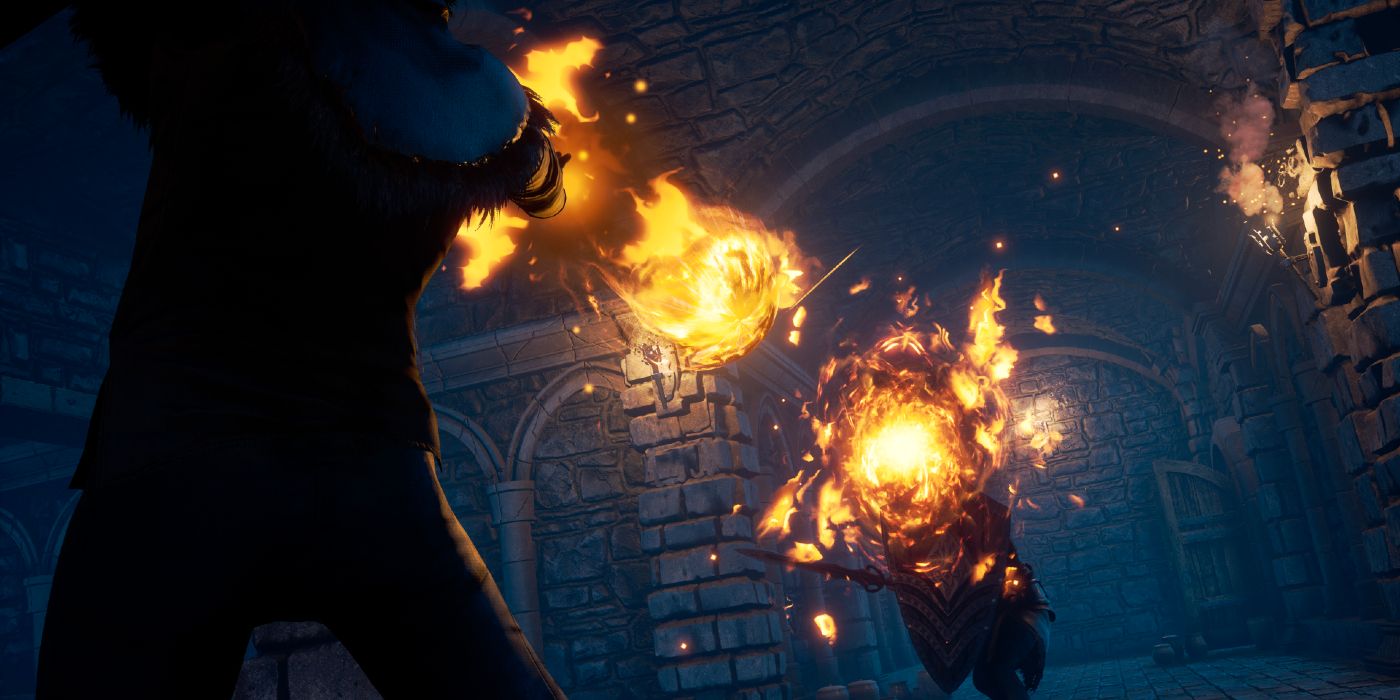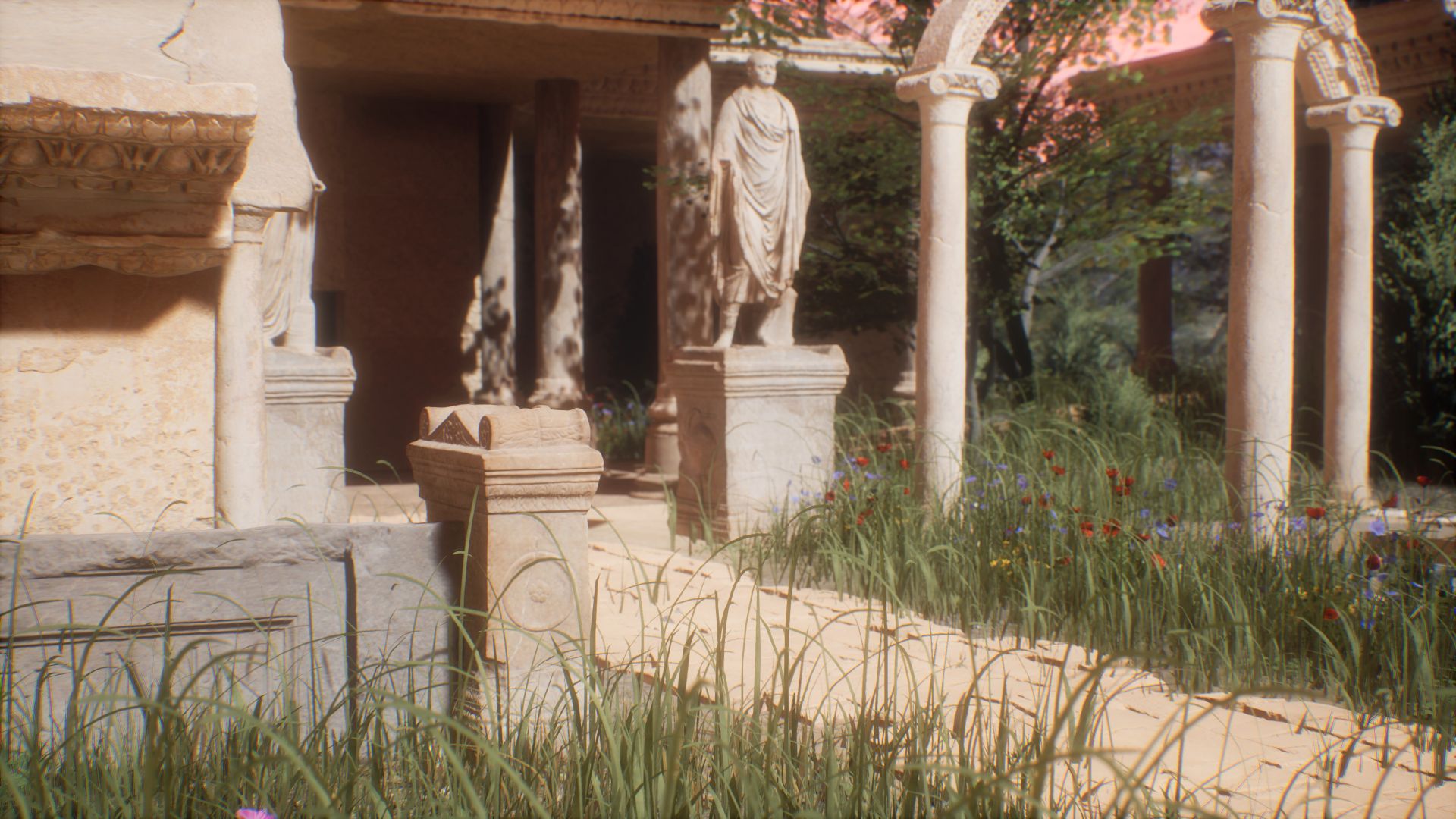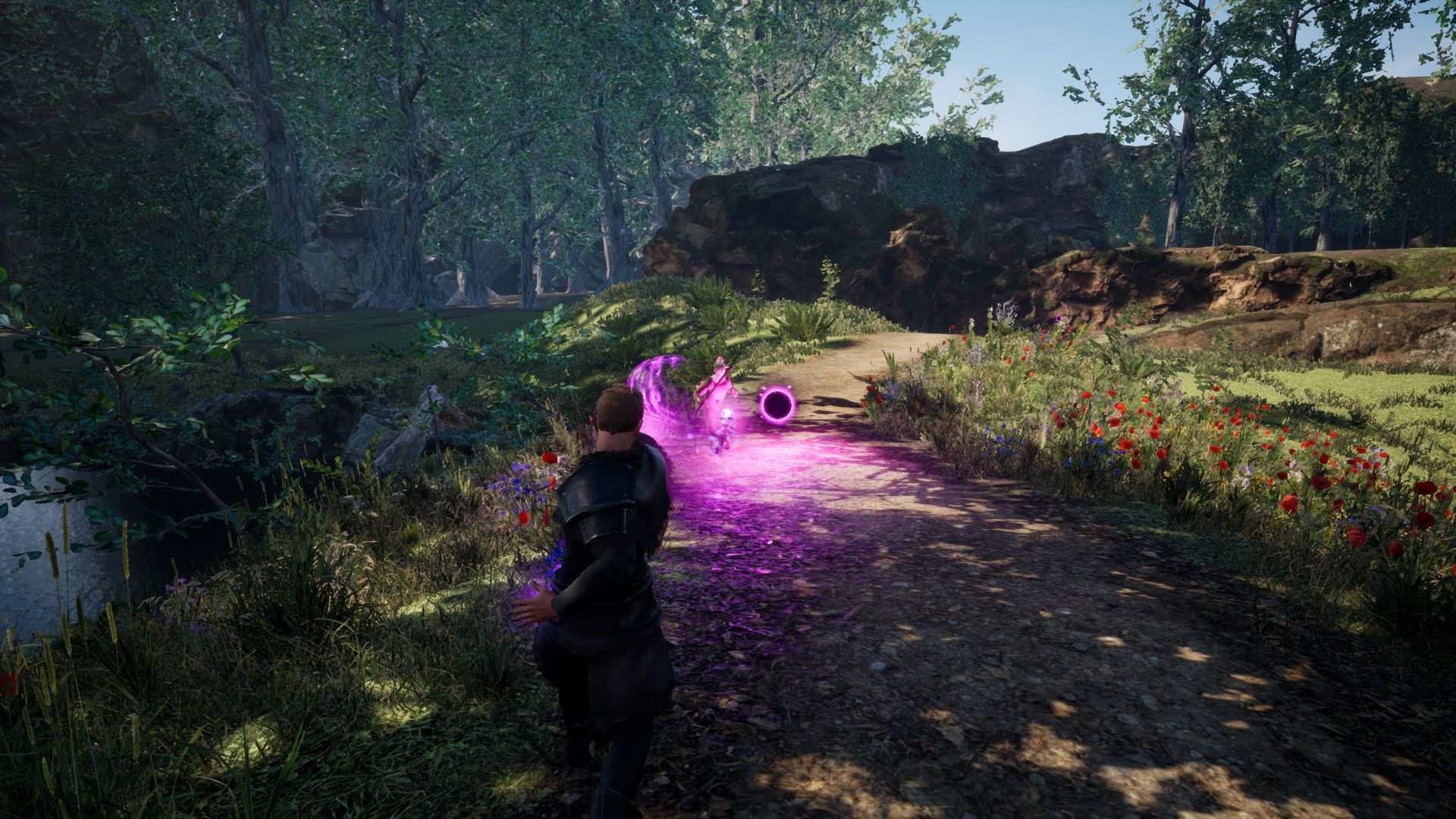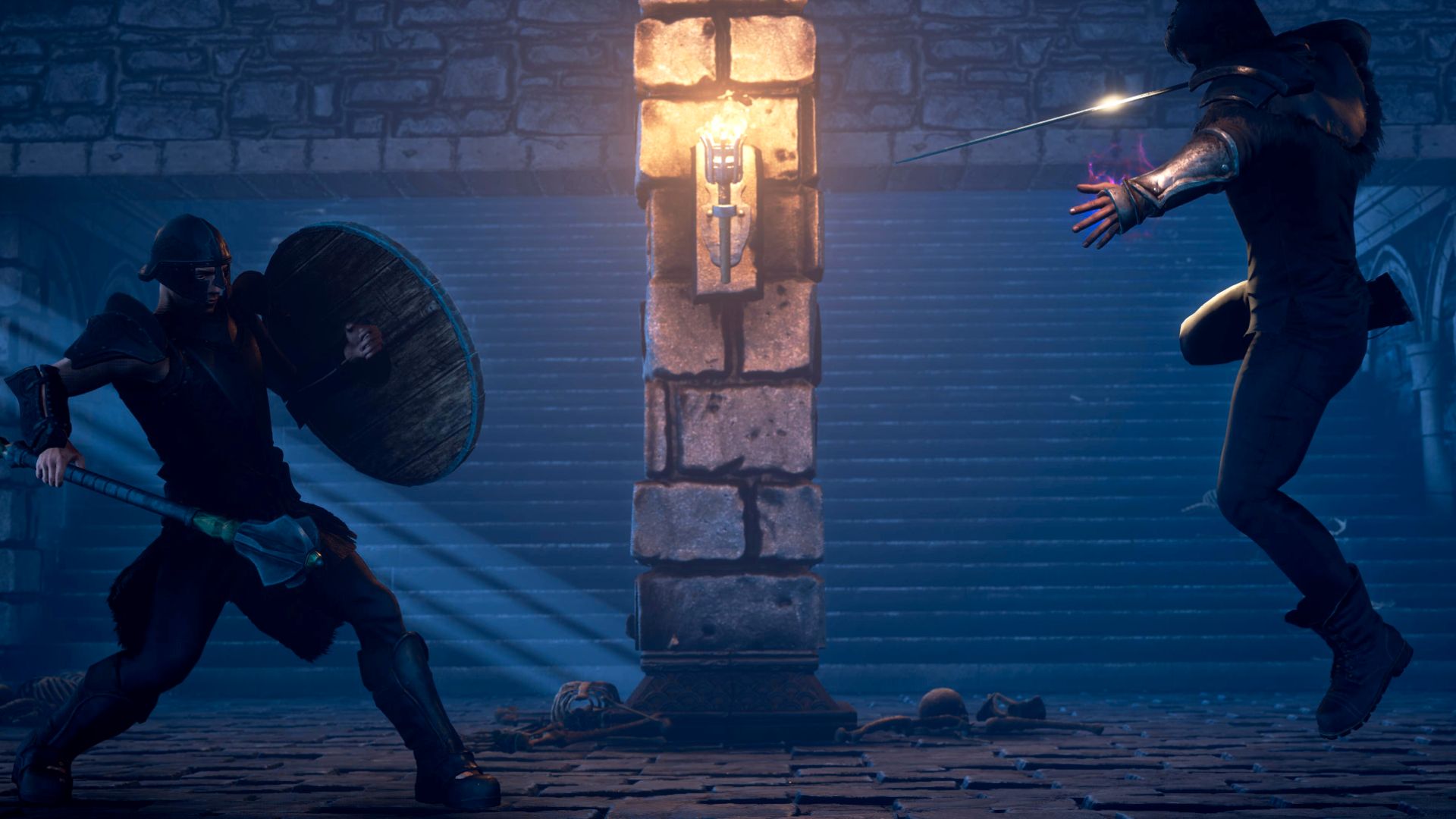
Indie game developers often add their own spin to ideas established by fan-favorite AAA titles. For example, Christopher Gottron's recent Kickstarter success Cloudscape mixes The Legend of Zelda: A Link to the Past's combat with the farming sim trappings of Harvest Moon and Stardew Valley. Kelechi Apakama's main focus of improvement in the open-world RPG Stormrite is magic-based combat.
Stormrite wears its comparisons to The Elder Scrolls 5: Skyrim on its sleeve, with Apakama saying the reason he decided to make an open-world RPG is that Skyrim is his "favorite game ever." The developer has previously published a few basic mobile games, but Stormrite is undoubtedly an ambitious first venture into the larger-scale world of PC and console gaming. Game Rant spoke to Apakama before Stormrite's August 3 Kickstarter launch about how his small team hopes to revamp magic in a dark medieval-fantasy world and create more dynamic choices for players, among other ambitions.
RELATED: Spirit Swap Dev Discusses Inclusivity and Game Lore

After Apakama decided to work on Stormrite in January 2020, he was alone for the first six months. Since then he has hired on three artists, as well as gotten help from a composer and a friend who is "quite talented and into fiction writing" to get the game's soundtrack and narrative going. Much of the programming has remained under his control, leading to many long nights working amid Covid-19 lockdowns over the last year-and-a-half. The main aim for Stormrite's Kickstarter is to hire more team members on a contract or permanent basis, allowing him to allocate resources to "hopefully make the game progress a lot quicker."
That being said, Stormrite will continue development even if the Kickstarter misses its goal, as the team has already developed a groove it will fill until Apakama can potentially hire for the extra roles later. Much of that development is still focused on populating the eight-by-eight kilometer kingdom of Redreach with different areas, cultures, and civilizations. There are currently plans for five portions of Redreach that each house different cultures, and those are being tackled piecemeal.
"We're getting a lot of stuff done with the same theme so we can fill it in, move on to a different area, and take the world by chunks. I think that's the most efficient way to do it."
The centermost region of the map is occupied by the Roman-inspired civilization of Agrippa, with much of its design based on Crytek's Ryse: Son of Rome — the first game Apakama got for his Xbox One. "I think it captures a Roman civilization quite well, not that I'm much of a historian," he said. It's the only civilization detailed on Stormrite's website; filled with citizens who have become "mind-numbed" husks due to overuse of an addictive elixir that once granted its people the edge in a three-year war. Most everywhere else is being kept close to the chest, but Apakama said they are currently working on a Viking/medieval-inspired region to the west.
Apakama feels storytelling is the main seller for most open-world RPGs, and wants to get more writers on board to flesh out the game further. One area he's interested in iterating upon is open-ended quests. He said the team is aiming for every quest to have multiple endings, "Because a linear questline feels like it's holding your hand and dragging you through." This includes multiple endgame scenarios that he did not want to spoil, but ultimately he hopes the game will have a ton of replayability similar to Skyrim.

Another element contributing to Stormrite's replayability will be its branching skill tree. Players can obtain skills based on combat, stealth, and diplomacy among others, adding different ways to interact with NPCs and entire civilizations as players decide who to help and who to attack. Apakama said when players choose a branch of the skill tree they won't be able to transition to something else. This doesn't mean they're immediately locked into a specific path, but it will encourage players to think ahead to how they want to play and encourage repeat sessions.
RELATED: Star Wars Jedi: Fallen Order's Hidden Skill Tree Hints at Big Things for Sequel
One of the game's major deviations from the likes of Skyrim is how it handles magic. Apakama said the typical mana bar that exists with no explanation and regenerates automatically is something he wants to improve. "In Stormrite, no human has magical powers," he said. Instead, everyone - including the young squire protagonist - draws mana from "focus crystals" with limited energy that can be found or potentially bought. Spells will vary in power based on the crystals a player utilizes, and "most spells will be mixable" so long as they make sense together. This is showcased in the game's Kickstarter launch trailer, in which the player launches a slower void orb that explodes and powers up the much faster arcane missile fired into it.
The titular Stormrites are also part of the game's magical identity, being six scrolls inscribed with rites devised in an ancient tongue that grant unimaginable power when spoken - power seemingly tied to the cataclysmic demonic entity Requiem. Beyond iterating on games like Skyrim and Ryse: Son of Rome, Stormrite's combat and horse-riding also draws from CD Projekt Red's The Witcher series. However, Apakama said the game will thrive on its original ideas and enhancements to those pre-established mechanics.
"Whenever I look at a mechanic from a game, I never want to take the mechanic - no matter how good it is. That's not creative, that won't give a different player experience. We still try to improve upon the mechanic in some way if we take inspiration."

Stormrite is currently being developed for PC and Xbox consoles using Unreal Engine 4. The plan is to have a game with next-gen features, taking advantage of faster loading times on Xbox Series X/S thanks to its solid-state drive (SSD). However, an Xbox One version is also in the cards, as Apakama and his team want to cater to those who cannot afford to upgrade. PlayStation releases are also not out the window, as the PS5 also includes features like SSDs, though Xbox is the primary goal for Apakama because "I have an Xbox and I prefer it from a personal standpoint."
To make next-gen development easier, Stormrite is being transitioned to Epic Games' Unreal Engine 5 in "the next couple of months." Apakama said it will take a few months to transition, but development time will be cut down overall thanks to the engine's technological advancements. He specifically points to not worrying about polycounts or making multiple levels of detail for meshes, which should also help with challenges like performance optimization.
With Bethesda games like The Elder Scrolls 6 and Starfield currently being developed for next-gen consoles too, it should be interesting to see how a smaller team like that working on Stormrite handles the open-world RPG formula with new bells and whistles. Its imminent Kickstarter may impact how quickly those ambitions can come to life, but ultimately Apakama is confident thanks to the support from fans he's received thus far. "We wouldn't be here without them."
Stormrite is in development for PC and Xbox, and can be wishlisted on Steam. Its Kickstarter campaign goes live on August 3, 2021.
MORE: Elementallis Interview: Developer Ivan Ruiz Lozano Details Plans for Kickstarter Hit

